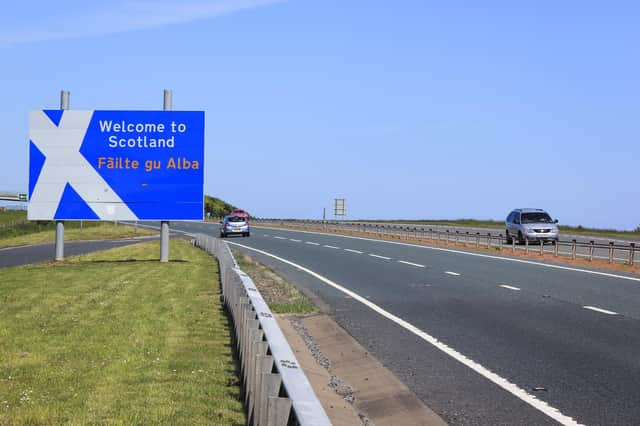Fact check: Labour peer's claim Scottish cross-border ban unlawful mostly false


He stated: “Just had confirmation that the Coronavirus 2020 Act does not give powers to Scottish Government to close the Scottish/English border, as we see also with Northern Ireland/Great Britain, but I do support Nicola Sturgeon's advice to avoid any such journeys unless they are necessary.”
While the exact legal point is potentially arguable, the claim from Mr Foulkes is mostly false.
Advertisement
Hide AdAdvertisement
Hide AdIt comes a month after Adam Tomkins, a respected constitutional lawyer in his own right and Scottish Conservative MSP expressed concerns around the rules.
He said: “Really not sure Holyrood has the competence to do this.
"I’m not saying the draft regulations published today are clearly ultra vires. I don’t think it is clear. But there are, at least, grave doubts about the legal competence to act in the way Scottish Ministers propose.”
Professor Tomkins, an expert in public law, highlighted potential issues around freedom of movement being reserved to Westminster and the rules potentially being contrary to the Common Travel Area framework which governs the movement of people between the UK and the Republic of Ireland.
However, the claim that the Coronavirus 2020 Act does not give the Scottish Government powers to enact a travel ban is mostly false.
The Coronavirus 2020 Act sets out the powers delegated to the Scottish Ministers in schedule 19, including a provision in that restrictions can cover a person “be subject to restrictions as to where the person may go”.
This was used alongside powers already in the hands of the Scottish Parliament through the Public Health etc. (Scotland) Act 2008 when drawing up the Health Protection (Coronavirus) regulations.
These regulations – passed as statutory instruments - cover the decisions on levels, travel bans, and other Covid-19 related legislation.
Advertisement
Hide AdAdvertisement
Hide AdThe impact on the Common Travel Area, the main point of contention for Prof Tomkins, is also limited.
While travel to and from areas within the Common Travel Area to Scotland is banned, travel through Scotland, such as from Dublin to Newcastle via Dumfries, is permitted making the CTA unlikely to have been breached.
Aileen McHarg, professor of public law at Durham Law School, states while there is no explicit permission for the Scottish Government to enforce a travel ban, the combination of powers “are probably sufficiently broad to cover it”.
She adds: “Secondly, is the closure of borders something that is within devolved competence?
"Even if acting under the Coronavirus Act which is UK legislation, the Scottish Ministers can only act within the competence limits set down by the Scotland Act.
"On this point, I’m fairly sure that a court would regard this as being for a devolved public health purpose and so any impact on immigration and the Common Travel Area (both reserved) regarded as merely incidental/consequential.”
“So, in sum, the legal position isn’t entirely clear, but I’m reasonably confident that a legal challenge to the regulations would fail.”
It is therefore mostly false to say that the Scottish Government does not have the powers for a travel ban.
Advertisement
Hide AdAdvertisement
Hide AdHowever, the ultimate decider on this would likely be the Supreme Court should the ban ever be challenged in court.
A message from the Editor:
Thank you for reading this article. We're more reliant on your support than ever as the shift in consumer habits brought about by coronavirus impacts our advertisers.
If you haven't already, please consider supporting our trusted, fact-checked journalism by taking out a digital subscription.
Comments
Want to join the conversation? Please or to comment on this article.